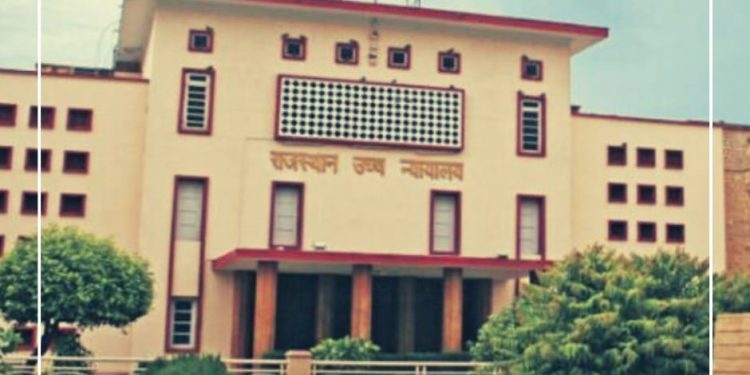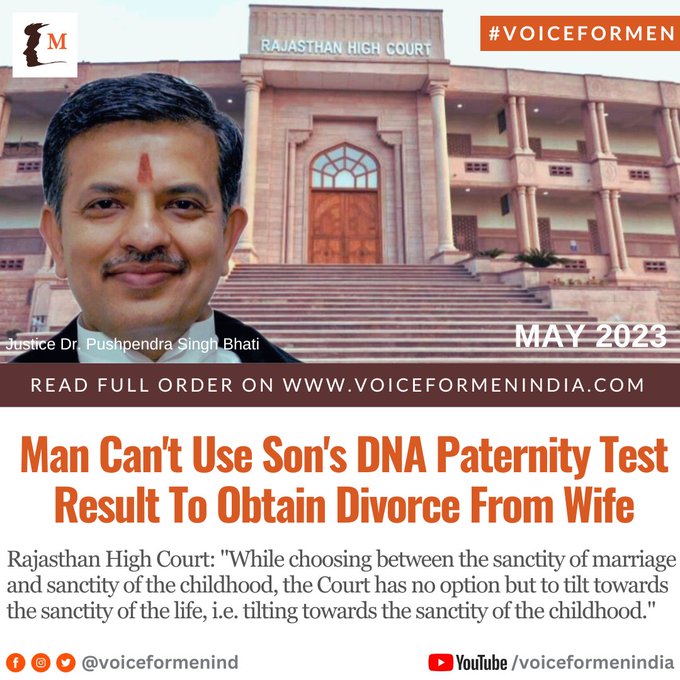The Rajasthan High Court in its order dated May 26, 2023 rejected a man’s plea to cite his son’s paternity test results in an impending divorce matter before the Family COurt.
Justice Dr. Pushpendra Singh Bhati of the Rajasthan High Court observed that the child cannot be used as a weapon to get divorce on grounds of adultery.
No One Can Be Forced By Courts To Undergo DNA Test As It Impinges Individual’s Privacy | Supreme Court
Case:
Parties got married in 2010 and a boy child was born to them in the year 2018.
In 2019, the wife left her matrimonial home and subsequently, the husband filed for divorce under Section 13 of the Hindu Marriage Act, 1955, in which initially there was no allegation of adultery. However, the husband in his application mentioned that his wife used to tell him that he is not the father of the child.
The husband then conducted his son’s DNA Paternity Test in 2019 without taking the child or his mother (wife) into confidence. The DNA Paternity Test Report revealed that he is not the father of the child. Therefore, the husband approached the Family Court again to amend his divorce pleading after the DNA test result.
Submission by Husband
Learned Senior Counsel for the petitioner-husband submitted that the DNA Paternity Test Report dated 11.09.2019 clearly reveals that the petitioner-husband is not the father of the child.
Learned Senior Counsel further submitted that a Family Court, dealing with matrimonial matters, has the power to order conducting of the medical test, owing to the issue involved in a particular case, and the same would certainly not amount to violation of the right to personal liberty, of any person, as enshrined under Article 21 of the Constitution of India.
Supreme Court Grants Bail To 84-Year-Old Man In Rape Case After DNA Report Confirms He Is Not Father Of Victim’s Child
Family Court, Udaipur
The Udaipur Family Court rejected the husband’s plea to amend the divorce pleading, on the basis of DNA Paternity Test of the son. Subsequently, the husband approach High Court.
Rajasthan High Court
At the outset, Justice Dr. Pushpendra Singh Bhati rejected the husband’s appeal thereby observing,
DNA Test invades upon the rights of a child, which may range from affecting his property rights, right to lead a dignified life, right to privacy and right to have the confidence and happiness of being showered with love and affection by both parents.
The DNA Paternity Test requires to be conducted only in exceptional cases, and therefore, the child cannot be used as a weapon to get divorce on ground of adultery, on the strength of outcome of a DNA Paternity Test.
Family Court Must Aid Wife To Procure Evidence For Proving Husband’s Adultery: Delhi High Court
Access to Wife – Indian Evidence Act
The High Court then referred to the Section 112 of the Indian Evidence Act, 1872, which states that it is necessary for the man to first prove that he had no access with his wife. The High Court observed,
Only thereafter, the benefits of exceptional exclusion from the purview of Section 112 of the Indian Evidence Act, 1872 can be extended to the aggrieved party.
The Court added,
The record of the case clearly reveals that the petitioner- husband and the respondent-wife were living together at the time of birth of the child (son), and thus, the husband was having access for cohabitation; thus, the question regarding presumption under Section 112 of the Indian Evidence Act does not even arise in the present case.
WATCH VIDEO: Indore Man Dies By Suicide Accusing Wife Of Extra-Marital Affair; Refusal Of DNA Test For Both Children
The High Court regarded the mental and physical health of a child to be supreme and the aspects of DNA test result adversely affecting it. The Court observed,
It is high time that the society and law realize the importance of the child and childhood vis-a-vis the matrimonial disputes, as losing and winning in a marriage is having a dwarfed impact, when it is compared with losing of childhood, in terms of victimising the child or sacrificing his constitutional right of dignity, at the altar of matrimonial conflicts.
The case has to be seen through the prism of the child and not through the prism of the “cantankerously fighting parents”.
Justice Bhati affirmed that a child cannot be used as a pawn in a divorce litigation, where either of the parents want to get rid of the spouse, while sacrificing the crucial rights of the child to a dignified parenthood. The Court added,
The pain of winning or losing a battle of divorce amongst the contesting spouses is much trivial when compared with the rights of the child to have dignity and parenthood.
READ ORDER | Muslim Father Taking Away Sons Above 7-Years Of Age From Custody Of Mother Is Not Kidnapping: Andhra Pradesh High Court
Concluding the matter, Justice Bhati said,
This Court is quite conscious of the fact that any frivolous claim of the husband or wife would have much adverse affect on the mental health of the child; though the husband has a right to prove adultery on the strength of cogent evidence against his wife.
While refusing to grant relief to the husband, the Rajasthan High Court said,
While choosing between the sanctity of marriage and sanctity of the childhood, the Court has no option but to tilt towards the sanctity of the life, i.e. tilting towards the sanctity of the childhood.
The parties may or may not lose the marriage, but the spirit of justice cannot afford to lose the child/childhood, as no Court can shut its eyes, so as only to achieve the goal of justice in matrimonial redressals, while losing the battle of parenthood, being detrimental to the childhood.
READ JUDGEMENT: Wife’s Infidelity Cannot Be Basis To Seek DNA Test For Determining Child’s Paternity In Matrimonial Dispute: Supreme Court of India
Section 112 in The Indian Evidence Act, 1872
112. Birth during marriage, conclusive proof of legitimacy.—The fact that any person was born during the continuance of a valid marriage between his mother and any man, or within two hundred and eighty days after its dissolution, the mother remaining unmarried, shall be conclusive proof that he is the legitimate son of that man, unless it can be shown that the parties to the marriage had no access to each other at any time when he could have been begotten.
LEAVE YOUR COMMENTS BELOW:
READ ORDER | Man Can't Use Son's DNA Paternity Test Result To Obtain Divorce From Wife: Rajasthan HC
— Voice For Men India (@voiceformenind) June 9, 2023
▪️2010: Marriage
▪️2018: Son is born
▪️2019: Wife leaves; Husband files divorce; DNA Paternity Test result confirms he is not the father#VoiceForMenhttps://t.co/EDqhquZhhE
ALSO WATCH:
Join our Facebook Group or follow us on social media by clicking on the icons below
If you find value in our work, you may choose to donate to Voice For Men Foundation via Milaap OR via UPI: voiceformenindia@hdfcbank (80G tax exemption applicable)
































